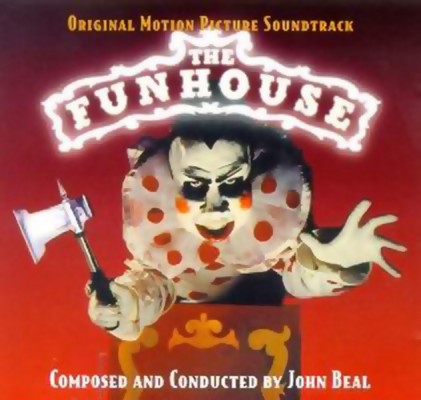John Beal’s original score for the cult classic The Funhouse is now available through iTunes, Amazon and other online stores. CLICK HERE
In the horror boom of the early 1980’s, the concept of non-bloody genre entry, one that uses ambience and calculated jolts of action to scare audiences, became popular with a younger generation of viewers. Despite the introduction of slasher films at about the same time (led by the Friday the 13th series), director Tobe Hooper took the long awaited concept of carnival horror to new heights one year before he would stake his claim to fame for Steven Spielberg’s Poltergeist.
As funny as it may seem when thinking back on that period of time, crazy carnival movies with homicidal monsters lurking within weren’t necessarily the same recipe for stupidity that they became a few decades later. In fact, Universal Studios commissioned then-anonymous author Dean Koontz to write a novelization based on the screenplay for release before the actual film hit the theatres. With over a million copies of the book foreshadowing The Funhouse sold off the shelves before the cinematic release date, the appeal of the film was well established. While the project did not receive the success hoped for at the time, the feature film became a cult phenomenon by the 2000’s. It’s tale of four teenagers trapped in a traveling carnival funhouse with a deranged, deformed, and masked killer (another Rick Baker masterpiece), and the story is certainly not forgiving to the youngsters. Combining a tiny bit of slash with a good dose of monster and visual confusion, history has largely determined that The Funhouse is certainly less derivative than its purely slashing siblings, and part of that strong, unique equation is due to composer John Beal’s memorable score. Known mostly for his work on the television show “Happy Days” at the time, Beal would take the opportunity to reintroduce the complex orchestrations of the classic horror genre for The Funhouse and help establish the versatility that led him to become one of the kings of movie trailer scoring in the decades to come (before libraries of generic muck replaced original trailer music in the industry). Beal’s involvement with this specific sound continued with his subsequent work for the mini-series adaptation of Stephen King’s It
Indeed, Beal’s return to traditional attention to high class details in The Funhouse makes it more timeless than the film could ever be. For the largely symphonic score, the depth and range of the performing group is surprisingly crisp, even with its somewhat advanced age. Aggressive in his approach from the start to finish, Beal makes no attempt to hide the element of suspense. After a wickedly striking opening cue, during which an innocent flute is struck down by orchestral hits and violin slashing of yesteryear, Beal continues to tighten the score’s grip as it progresses. A slightly waltz-like rhythm (always appropriate for a carnival atmosphere) slowly churns in early cues and eventually explodes with all of its ominous force realized in the final two cues. The depth of the string section in the recording for The Funhouse is a defining element, with lofty, full performances of meandering, strangely melodic ideas weaving constantly throughout. A heightened sense of unique orchestration is also present, with non-traditional instrumental sounds employed to tingle your nerves. A slight electronic presence in the bass region (typical to the era) is employed but not relied upon. The score is edgy in its rhythmic progressions, never hesitating to take the opportunity to reach a cymbal-crashing crescendo when a monster is sighted on screen. The propulsive nature of the music, along with its surprising size and sound quality, make The Funhouse a much better than average effort in its genre. **** -FILMTRACKS

